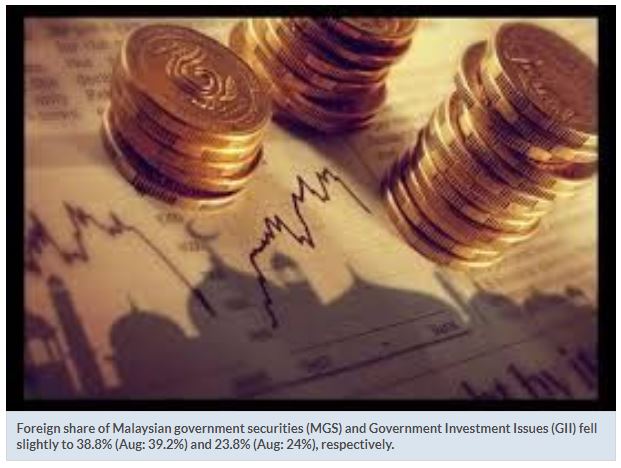Malaysia: Foreign interest in local bonds strong
PETALING JAYA: Despite the third wave of Covid-19 sweeping the country and new clusters emerging, foreigners remain bullish on Malaysian bonds.
For the fifth month in a row, foreign inflows into the ringgit debt securities or bonds in September recorded net foreign inflows, albeit lower than in August.
Amid the virus spreading into other states, fixed-income analysts and economists are upbeat that the government would be able to flatten the curve and attract foreign buying of Malaysian debt papers.
Furthermore, the dovish stance by the United States Federal Reserve (Fed) would see investors hunting for higher yields in emerging markets, including Malaysia, said an analyst. The increasing weight of Malaysian government bonds in the JPMorgan Government Bond Index-Emerging Market (GBI-EM) would be another plus point, he added.
Maybank Kim Eng in a note said foreign inflows into the ringgit debt securities tapered off to RM0.5bil in September (Aug: RM3bil) amid Bank Negara’s interest rate pause and the FTSE Russell decision overhang.
Foreign share of Malaysian government securities (MGS) and Government Investment Issues (GII) fell slightly to 38.8% (Aug: 39.2%) and 23.8% (Aug: 24%), respectively.
Maybank Kim Eng head of fixed income research Winson Phoon (pic below) said the slowdown in foreign inflows was not a surprise, given the weaker domestic bond sentiment after the central bank’s rate pause in September, soft government bond auctions and defensive positioning before the FTSE Russell annual review in late September.
Compared to regional bond markets, he said the ringgit debt securities fared slightly better than Indonesian government bonds, which continued to see net outflows of US$0.6bil (Aug: US$0.3bil).
Recall that on Sept 24, FTSE Russell announced the inclusion of Chinese government bonds into the World Government Bond Index (WGBI) beginning October 2021, with a 12-month phase-in period.
Malaysia, on the other hand, has been retained on FTSE Russell’s watchlist for a potential downgrade from Market Accessibility Level 2 to 1.
According to CGS-CIMB Research, China’s recent inclusion in the WGBI would result in the dilution of Malaysia’s weightage.
This could, in turn, potentially lead to multi-billion-ringgit net outflows from the Malaysian capital market, the research house said. The downgrade would render Malaysia ineligible for inclusion in the WGBI. For now, Malaysia remains on the index.
However, AmBank Group chief economist Anthony Dass, who is also a member of the Economic Action Council secretariat, told StarBiz he was positive on Malaysian bonds.
Foreign interest in Malaysian government bonds, which are among the higher-yielding ones in the region, would continue to be on the radar screen, he said.
It would be supported by improving sentiment reflected by the economic indicators which continue to rebound, attractive real interest rates compared to its emerging-market peers and ample global liquidity, he said.
“The outlook for the bond market remains favourable. The positive development from the FTSE Russell review added with the view that liquidity improvement has helped implies the central bank’s efforts to improve bond liquidity is working, Also, the bond market is supported by a return to the index-based investors who are expected to stay.
“Furthermore, it is rather too early to raise the alarm on the dilution effect following the inclusion of China into the global bond index. The rebalancing will start in October 2021 over a 12-month, phased-in period, ” Dass said.
He said the corporate bond outlook depends much on the recovery of the economy and the rolling out of large government infra projects like the LRT3, MRT2, East Coast Rail Link and national fiberisation and connectivity plan, and liquidity. For 2020, corporate bond issuances would come in at RM80bil-RM95bil.
On outflows, Bank Islam chief economist Mohd Afzanizam Abdul Rashid told StarBiz that the chance of that happening was somewhat low.
“What matters to the fixed income investors is the outlook on the overnight policy rate (OPR), which is obviously tilted to the downside. Since the bond prices and interest rates are moving in different directions, a lower OPR would mean bond prices would go higher.
“So there is potential capital gain to be made from the bond market. Additionally, the ringgit remains undervalued with the long-term average being around RM3.62 since the currency peg was removed in July 2005. That could motivate foreign funds to stay long on Malaysian government bonds.
“Again, there could be further appreciation of the ringgit along the way, which then could enhance their total returns, ” he said.
Despite that, Afzanizam said there could be a concern on the fiscal deficits in light of the expected widening of the budget gap following the stimulus measures.
However, he said such policy responses were done in light of the severe economic shocks due to the spread of the deadly virus.
“Therefore, it is understandable and the government is committed to ensuring that fiscal deficits will remain under control. So, the case for lower bond yields are clear. It’s just that there would be volatility, ” he added.
Dass is projecting the three-year MGS at 1.90% to 2.10%, five-year MGS at 2.30% to 2.45%, and 10-year MGS at 2.60% to 2.80%.
Source: https://www.thestar.com.my/business/business-news/2020/10/12/foreign-interest-in-local-bonds-strong


 English
English





